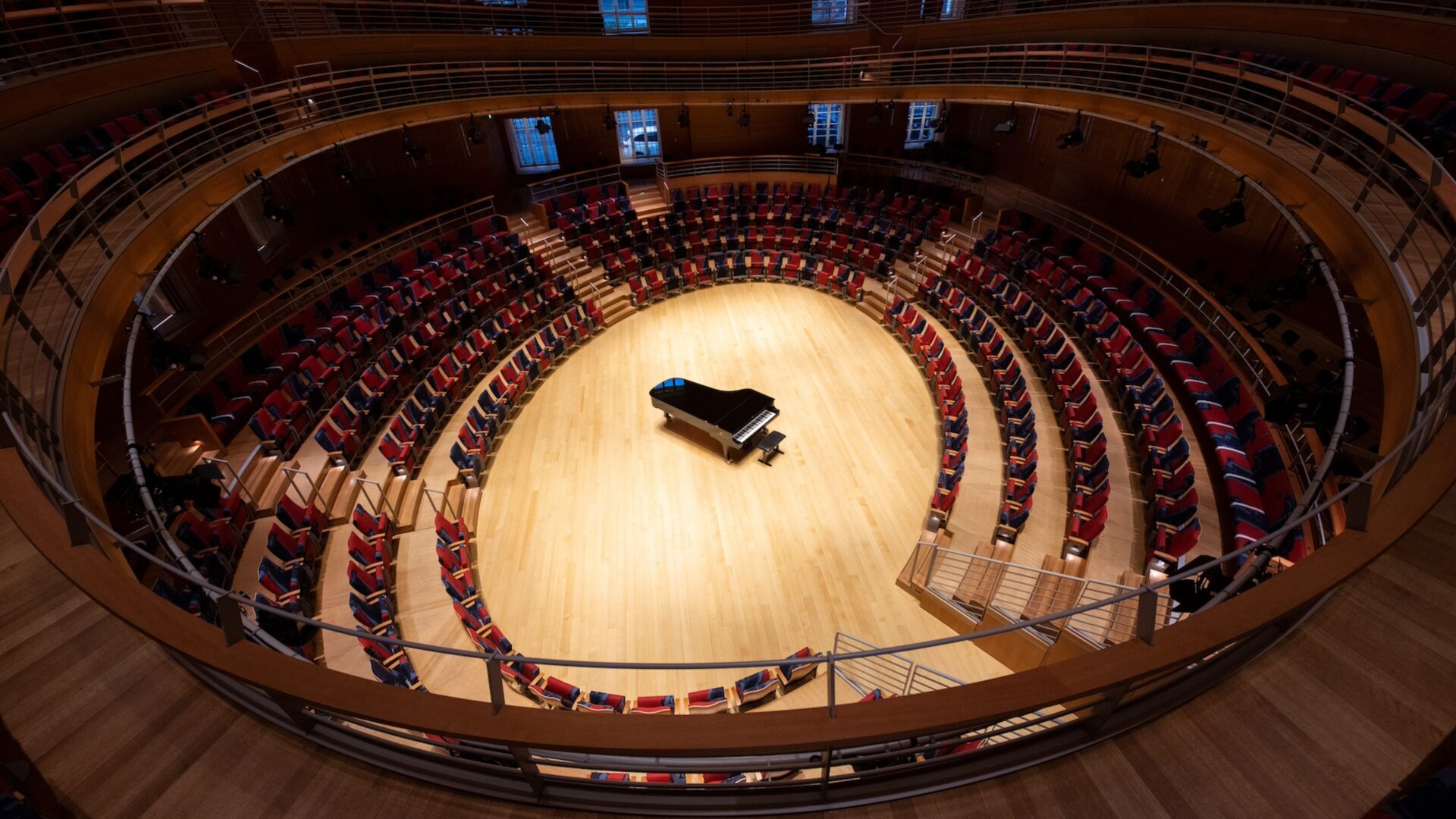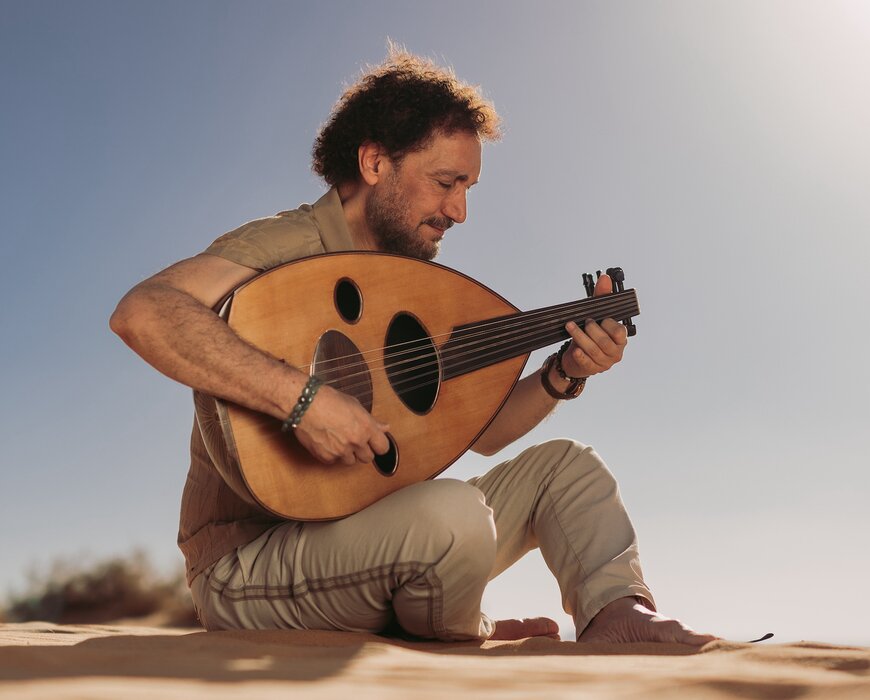Sun, September 17, 2023 at 7:30 PM
NASEER SHAMMA & MEMBERS OF THE 2350BC ORCHESTRA
Arabic Music Days
Pierre Boulez Saal
artists
Naseer Shamma Nehad El-Sayed Mohamed Abozekry Ahmad Shamma Bacem Yousfi Abdallah Abozekry | Somar Al-Nasser Islam Taha Michael Onsi Azza Mandolin Salma Mokhtar NoraThiele |
While in European music history the organ has traditionally been regarded as the “Queen of Instruments,” it is without a doubt the oud that takes the same place in the music of the Arabic world. Few artists today have achieved greater recognition in promoting the instrument than Naseer Shamma, curator of the Arabic Music Days. As a virtuoso performer, educator, and cultural ambassador, he has not only raised the profile and visibility of the oud around the world, but also developed the instrument itself by adding and changing details of its construction. The “Oud Houses” he established in several cities across the Arabic world have become important training centers for the next generation of musicians.
For the 2023 Arabic Music Days, Shamma has invited fellow oud players and ensembles consisting of students and teachers from the Oud Houses in Cairo, Abu Dhabi, and elsewhere. An extensive program of film, literature, and visual art will provide additional perspectives of contemporary Arabic culture on site and online.
Supported by the Abu Dhabi Festival
Artists
Conductor and Oud
Oud
Oud
Oud
Oud
Poet
Oud
Poet
Mandolin
Oud
Oud
Oud
Saz
Percussion
watch
THE ARTISTS
Naseer Shamma
Naseer Shamma is among the world’s foremost players and teachers of the oud. He trained at the Music Academy in Baghdad with Iraqi grand master Munir Bashir and from 1993 taught for five years at the Conservatory in Tunis. In 1998 he founded the Arab Oud House in Cairo, a school dedicated entirely to his instrument. Other schools have subsequently opened in Abu Dhabi, Constantine (Algeria), Alexandria, and most recently in Baghdad. He has performed with musicians from a wide range of backgrounds and in many of his projects combines traditions and instruments of classical Arabic music with those of Western music. In 2017, he was named a UNESCO Artist for Peace. As curator for the Arabic Music Days, he has been closely associated with the Pierre Boulez Saal since its opening.
Mohamed Abozekry
Born in Cairo in 1991, Mohamed Abozekry began playing the oud at the age of 11. After studying with Naseer Shamma at the Arab Oud House in his hometown for four years, he continued his education with Hazem Shaheen and Nehad El Sayed. Moving to France at the age of 18, he studied Musicology, Applied Music for Visual Arts, and Film Scoring at Lyon University. He has written film scores for several projects, including the anthology film 18 Days, which premiered at the 2011 Cannes Film Festival, and the short film N’sibi. He has worked with various artists in a broad variety of musical formations, among them the group Heejaz, the “Sufi project” influenced by the traditional and classical music of Egypt, and the Trio Abozekrys with his brother Abdallah Abozekry and Nicolas Thé, who released their album Don’t Replace Me by a Machine in 2018. He currently works on his debut album as a singer / songwriter.
Abdallah Abozekry
Abdallah Abozekry is an Egyptian saz player, music producer, and composer from Cairo. He graduated from the Oud House in his hometown in 2010. Since relocating to Paris in 2015, he has collaborated with artists from various backgrounds, including Sophie Alour and Joce Miennel. In 2018, he formed the Trio Abozekrys together with his brother, oud player Mohamed Abozekry, and French drummer Nicolas Thé. He also performs in the duo project Zamakan with French guitarist Baptiste Ferrandis.
Somar Al Nasser
Born in Homs, Syria, Somar Al Nasser on oud and buzuki at the Conservatory and the Oud House in Cairo. Today he lives in France and performs traditional repertoire as well as jazz.
Nehad El-Sayed
Born in Cairo, Nehad El-Sayed studied oud at the Oud House in his hometown and later composition and music theory as well as jazz and media arts at the Hochschule der Künste in Bern, Switzerland. He has performed at renowned festivals in Cairo and Alexandria, as well as in Syria, Oman, Lebanon, Algeria, Jordan, Tunisia, Italy, and Switzerland, where he is currently based. He has composed works for various ensembles and orchestras and teaches at the Basel Music Academy and the Biel Music School. He has released the albums Water Wheel (2007), Yarns (2014), and, most recently, Jetzt (2016).
Salma Mokhtar
Born in Egypt in 1995, Salma Mokhtar studied with Naseer Shamma at the Oud House in Cairo. She has performed with the school’s orchestra at El Sawy Culturewheel, El Manial Palace, and the Cairo Opera House, among others. Together with Naseer Shamma she has appeared in Abu Dhabi, at the Ithra Theater in Dhahran, Saudi Arabia, and at the 2021 Global Oud Forum.
Michael Onsy Messiha
Michael Onsy Messiha is a graduate of the Cairo Oud House. He performs in Egypt and beyond with various ensembles as well as his own project Mood of Oud, which he launched in 2019.
Ahmad Shamma
Iraqi oud player Ahmad Shamma received his training at Baghdad University’s College of Fine Arts and later with Naseer Shamma at the Cairo Oud House, where he graduated with honors in 2007. He subsequently taught at the Oud Houses in Cairo and Abu Dhabi before joining the faculty of Sorbonne University’s Abu Dhabi branch in 2013. He has performed in numerous countries throughout the Arabic-speaking world and beyond. In 2014, he released his debut album Arabian Springs. In addition to his stage career, he also works as a composer for other artists as well as in film and television.
Islam Taha
After graduating from the Cairo Oud House in 2014, Islam Taha started teaching there and later took over the school’s direction. He has led the orchestra of the Oud House as well as Egypt’s first all-female oud orchestra at numerous festivals at home and abroad. As a member of Naseer Shamma’s 2350BC Orchestra and with his own ensemble Juthoor, he has given concerts in Spain, Saudi Arabia and the United Arab Emirates, among other places. He was awarded first prize and the title “king of oud” at the 2022 Oud Festival in Riyadh, Saudi Arabia.
Nora Thiele
Nora Thiele is among the most versatile percussionists in Europe, specializing in frame drums. As a soloist, guest musician, and with her own ensembles she has performed throughout Europe, in the Middle East, and China blending early music, jazz, improvisation, and contemporary music. She studied traditional percussion, drum set, and piano in Leipzig and has been artistic director of Weimar’s Playground Festival since 2013.
Bacem Yousfi
Bacem Yousfi has been playing the oud since the age of eleven. His teachers included Walid Nammouchi and Naseer Shamma at the Oud House Cairo, where he taught for two years. With Naseer Shamma he performed in various ensembles in Paris, Cairo, Abu Dhabi, Muscat, Tunis, Berlin, and Barcelona, among others. Since 2008 Bacem Yousfi lives in France, where he studied musicology in Lyon and Paris.
Lorca Sbeity
Lorca Sbeity works as a poet, writer, and journalist. She has published poetry, children’s books, and articles on political and cultural issues in a variety of outlets. Her books of poetry include You Are Mine Now, You Are Free (2004), Nothing but Insomnia (2014), and most recently This Is All Before You. Her children’s book Two Homes Instead of One was named Best Children’s Book at the 2017 Etisalat Awards at the Sharjah Book Fair.
Fowziyah AbuKhalid
As a poet, author, and scholar, Fowziyah AbuKhalid is among Saudi Arabia’s most important intellectual voices. In 1975, she published her controversial first volume of poetry Until When Will They Kidnap You on Your Wedding Night?. Her texts have been translated into English, German, and Italian, among other languages. In 2009, the first of nine volumes of her collected prose poems was published under the title Water of the Mirage. Holding a PhD in sociology and political science, she has taught at King Saud University and the University of Portland, among other institutions, and published numerous academic books and papers.
principal partner

YOUR VISIT
How To Get There
Pierre Boulez Saal
Barenboim-Said Akademie
Französische Straße 33d
10117 Berlin
_____
Public Transport
U-Bahn U2 Hausvogteiplatz, U5 Museumsinsel, U6 Unter den Linden
S-Bahn S / U Friedrichstraße
Tram M1, 12 Mitte / Am Kupfergraben
Bus 147 Werderscher Markt; 100, 300, N5 Staatsoper
Bicycle
Bicycle racks are available on the street “Hinter der Katholischen Kirche.”
Car
Q-PARK parking garage Unter den Linden / Staatsoper
Bebelplatz 2
10117 Berlin
Theater rate (5.30 pm – 11.30 pm, paid in advance): €10
Please note there is a construction site across from the hall on Französische Straße. The street is narrowed, and cars or taxis are not allowed to stop in front of the Pierre Boulez Saal entrance.
Opening Hours
Box Office
Monday to Friday 2 pm to 6 pm
Closed on weekends and holidays
On performance days, the box office opens one hour prior to an event on weekdays and two hours on Saturdays, Sundays, and holidays.
Papagena Call Center
Ticket hotline +49 30 4799 7411
Monday to Saturday 9am to 8pm
Sunday and public holidays 2pm to 8pm
Food & Drinks
Casalot Catering welcomes Pierre Boulez Saal visitors before and after concerts, serving a variety of dishes of Arab cuisine.
On concert nights, the bar opens one hour before the start of an event and remains open after the performance. You may also place pre-orders for intermission right at the counter.
More informantion on our catering can be found here.
Coat Check
Small bags up to a maximum size of A4 (21x30 cm) and jackets may be taken into the concert hall. Luggage, helmets, large umbrellas, and other bulky items must be stored at the coat check.
The coat check is free and located behind the staircase in the foyer, on the left-hand side.
Accessibility
To book wheelchair-accessible seating, other seats for visitors with disabilities, or companion seats, please contact us directly.
+49 30 4799 7411
tickets@boulezsaal.de
All wheelchair seats are accessible by elevator. All visitors, including patrons using a wheelchair, will enter the Pierre Boulez Saal through the main entrance. Tickets will be checked at the hall doors.
In order to make access as easy as possible, we kindly ask that you inform us of your requirements when booking your tickets.
Restrooms for visitors with disabilities are located in the basement and on the balcony level and are accessible by elevator.
Four parking spaces for visitors with disabilities are available on the street Hinter der Katholischen Kirche.

